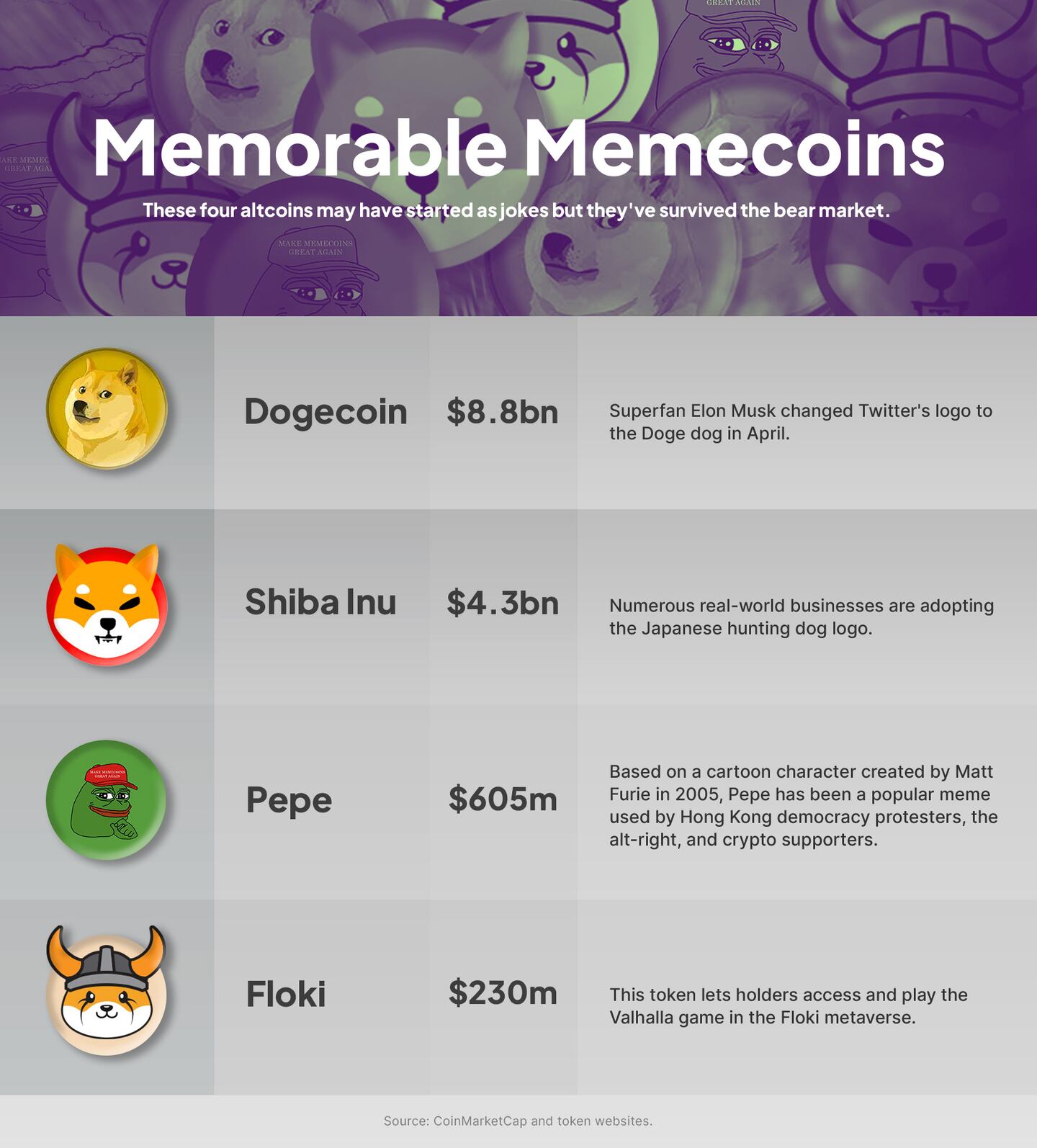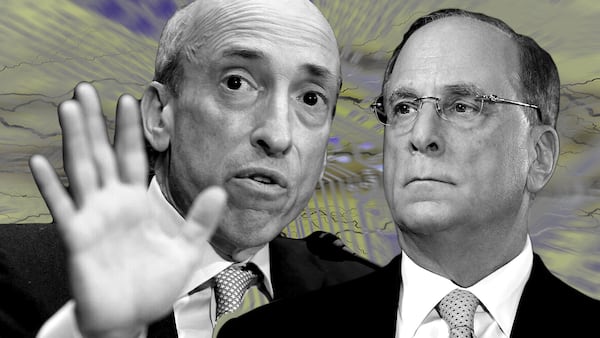- Designer Sveinn Valdimarsson weighing legal action to stop Shiba Inu team from monetising logo.
- Shiba Inu is leveraging logo in deals with fashion designers and wallet makers in bid to build business.
- Shiba Inu community says logo is fair game in a decentralised project.
Ever since the Shiba Inu altcoin hit the market in 2020, its Japanese hunting dog mascot has attracted legions of fans. Set up as a challenger to Dogecoin, SHIB is more of a stunt than a useful cryptocurrency. But with a $4.5 billion market cap, the token is no joke.
Now a number of companies are using the Shiba Inu logo for very real products.
Rocking web3
In July, the Swiss crypto storage firm Tangem plans to release a cold wallet featuring the orange canine. And in March, John Richmond, the Italian fashion house that’s dressed David Bowie, Lady Gaga and other artists, said an alliance with the token was coming to “rock web3.” The firm has adopted the Shibu Inu mascot for its Twitter profile image.
There’s even a fast food chicken joint in Naples, Italy, called Welly that’s using a Shiba Inu image inspired by the logo.
Fun stuff, right? But there’s an issue — Sveinn Valdimarsson, a 25-year-old designer who created the Shibu Inu mascot logo, is unhappy his handiwork is now being used for commercial purposes. And now Valdimarsson is imploring the Shiba Inu team to stop telling enterprises they can use the logo. He’s also looking for legal representation to stop the appropriation.
NOW READ: Crypto bettors’ uproar over Titan submarine puts spotlight on ‘decentralised truth’
“You can get a tattoo, put this on your T-shirt or your car and everything is good,” Valdimarsson, who goes by “ParadoxDesigner” online, told DL News. “But if you’re gonna put it on like a cigarette pack and call it Shiba cigarettes, that’s where you’re going to make money off it. And that’s where I want to see some honesty in you if you’re going to do that.”
Valdimarsson’s beef with Shiba Inu’s commercialisation shows how blurred the lines are becoming as web3 projects struggle to reconcile intellectual property rights with the freewheeling ethos of crypto. The idea that art or code or other features may belong to one person or group doesn’t exactly jibe with the cooperative nature of decentralised projects.

Valdimarsson didn’t trademark or copyright his mascot image. On the contrary, as a proud member of the Shiba Inu community he happily developed several prototypes for the cause back in 2020 before settling on the current image. True to its decentralised commitment, the community adopted the logo without any contracts or agreements on how it might be used.
And Valdimarsson confirms he gave the logo to the community with no expectation of compensation. “It was made for Shiba, it was made as the symbol for Shiba Inu,” said the Icelander.
Ownership rights
What he didn’t intend was for other ventures to use the orange dog for business purposes. Even if artists don’t register their work in some form, there is a legal doctrine in most jurisdictions that provides them with ownership rights, said Frederic Rocafort, an intellectual property lawyer with the international law firm Harris Bricken.
When it comes to allowing someone to use a logo they don’t own, he compares it to buying a house. If the seller isn’t the actual owner, they can’t sell you the house. It doesn’t matter if they say they are or even if they think they are the owner.
“If ultimately the house belongs to someone else, the transaction is just null and void,” Rocafort told DL News.
‘If you’re gonna put it on like a cigarette pack and call it Shiba cigarettes, that’s where you’re going to make money off it. And that’s where I want to see some honesty in you if you’re going to do that.’
— Sveinn Valdimarsson
Even so, Valdimarsson may have a tough time getting satisfaction. For starters, it’s unclear who or what “owns” or controls Shiba Inu. The altcoin was created during the crypto boom of 2020 by a person or group going by the name Ryoshi. Shiba Inu’s “Woof Paper” — its white paper — opened with a simple question: “What would happen if a cryptocurrency project was 100% run by its community?”
NOW READ: Crypto lobbyists hope Maxine Waters is wavering on Gensler’s crackdown
The community did quite nicely during the crypto market’s record run in the fourth quarter of 2021, with SHIB multiplying in value about 40 times. Valdimarsson was no exception, although he said a hack in November 2021 robbed him of his gains. Since then, SHIB has tracked the rest of the market back down to earth, and, no surprise, memecoins have missed the Bitcoin-driven rally this year, with Shiba Inu down 6% compared with an 84% surge in BTC.
Trying to work out who works for Shiba Inu isn’t easy. People come and go (there was a “coup” earlier this year during which several formerly prominent figures were pushed out, say community members), and there’s no team page on the website. Many, such as project lead Shytoshi Kusama, who replaced the founder Ryoshi following his or her departure in June 2022, are pseudonymous.
Mysterious team
But the same names come up in Twitter spaces and interviews, as well as among the mods on the project’s Discord. There’s Lucie, whose Twitter profile has 86,000 followers and says she’s a “Shiba Ecosystem Official - Content Marketing Specialist.”
She has appeared in an official capacity on Twitter spaces with “Mazrael.” This person has been variously described as a community member as well as a member of the games team. Last year, Marcie Jastrow, a former VP of Immersive Media at Technicolor, took on a role as an adviser for Shiba Inu’s metaverse.
Leveraging a logo
Over the last year, the Shiba Inu team has attempted to morph the project into something closer to a business by leveraging its logo into new partnerships. In a Twitter Spaces session on May 29 to discuss the new hardware wallet launch with Tangem, Lucie said the Shiba logo is “not trademarked” and is free to use.
“If you would like to use it on your clothes or whatever products you like to use in daily life, please feel free to share the Shiba logo,” said Lucie.
‘If you would like to use it on your clothes or whatever products you like to use in daily life, please feel free to share the Shiba logo.’
— Lucie
During the same session, Tangem’s marketing project manager Daria Bys said “quite a lot of people” had asked about the use of the Shiba Inu logo by the company. She added that Tangem was “collaborating with Shiba Inu totally officially. We have all the necessary permissions.” Its wallets cost $77 apiece.
Valdimarsson says he attempted to contact Tangem on at least two occasions but received no response.
Logo police
Community members on Shiba Inu’s Discord regularly tell those who ask that the logo is free to use or “public domain.” That term typically applies to works whose copyright has expired, such as books by classic authors such as Charles Dickens or old songs. But Shiba members don’t care.
“You are not the shib logo police!! If you own shib than you own that logo!” tweeted one user in May.
Trademarks for the logo have been filed in both Indonesia and Spain, though there’s no evidence they have been used.
And Shiba Inu recently announced a new project called Shibcals, the “in-real-life component of the Shiba Inu ecosystem.” It’s essentially another merchandise store selling hoodies, caps and toys, which will also make use of Valdimarsson’s logo design.
Meanwhile, Kunda, a vegan restaurant in the city of Chiang Rai in northern Thailand, is already using the logo with Valdimarsson’s permission. Its co-owner, Martin Straede, is one of Valdimarsson’s most vocal supporters in the fight to reclaim his logo.
The two recently attempted to strike a deal with yet another fried chicken restaurant, this one in Australia, who offered to help Valdimarsson establish his legal claim to the logo in exchange for being able to use it. The deal ultimately fell through as Valdimarsson felt the terms were too favorable to the restaurant, at which point the restaurant told him that it didn’t need him and was just going to use the logo anyway.
No permission
For Valdimarsson’s part, he says he doesn’t want to strip the token of its logo or hurt the Shiba Inu community. He doesn’t even want to deprive people of their bright orange Tangem wallets.
He just wants companies to stop profiting from his design without his permission.
“I think I could say it like this: the logo is as much mine as it is the people’s, but it’s more mine than a company’s,” he concluded.
Updated on July 6 to correct caption in table on Pepe memecoin and provide detail on its uses.



